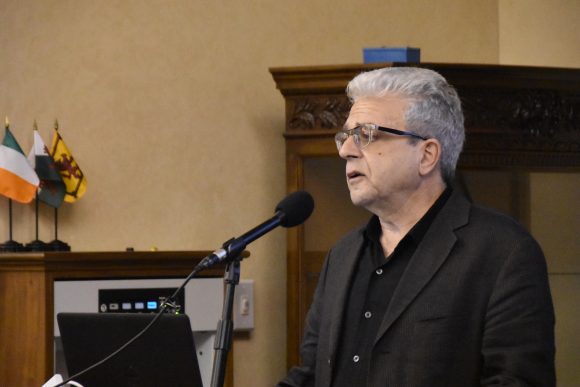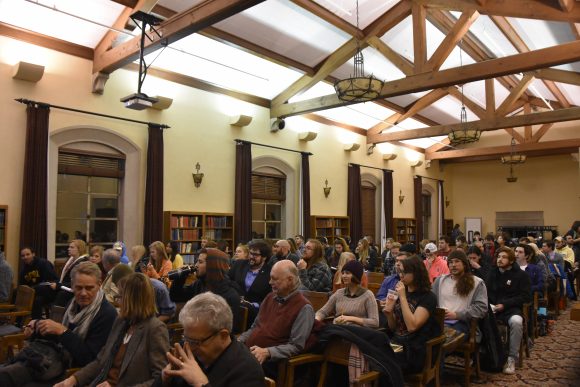
Robert Orsi gave a talk about the long problems with sexual abuse within the Catholic Church. Nov. 9, 2017 (Fiona Matson/CU Independent)
The structures and theology of the Catholic Church make it the ideal environment to enact and conceal clerical sexual abuse, professor Robert Orsi said in a lecture.
The talk, titled “Violence, Memory, and Religion Among Survivors of Clerical Sexual Abuse” was the 2017 Lester Lecture, an annual lecture sponsored by the Religious Studies department in honor of Robert Lester, late founder of the CU Religious Studies program. The series is meant to “address contemporary issues in the academic study of religion.”
Orsi is chair of the Catholic Studies department at Northwestern University. He was working on a project about faith formation in Catholic children when The Boston Globe broke stories about systemic clerical sexual abuse and its cover up by the Catholic Church in 2002. He decided to redirect his work to be about survivors of sexual abuse by clergy, specifically Catholic priests.
Orsi focused on survivors who used Catholic imagery to make sense of their lives, examining what survivors’ relationships to the Church were like post-abuse. He told stories from some of the people he spoke to for his research who shared struggling with questions of whether God was punishing them or if they were to blame for the abuse.
“It is virtually inevitable that it would not occur at some point to children who are raised in this environment that God had sent them this suffering,” Orsi said.
Orsi argued that abuse of young people in the Church was different than in other contexts, such as schools, because the way the Catholic Church was structured was uniquely easy for abusers to exploit. He said that due to the huge amounts of power priests hold in congregations — as Christ’s representative on earth and the person able to forgive sins — it is easy for abusive priests to pressure vulnerable people into sexual acts and to keep them quiet.
Orsi pushed back against the idea of the “pedophile priest” that is so popular in the common lexicon, arguing that by constructing a specific class of people who are doomed to prey on children, the field of psychology has failed to adequately deal with the reality of sexual abuse of young people. He explained that the Catholic church used the idea that pedophilia was a disorder that could be cured with psychological treatment to allow priests who had abused before to return to parish work with plausible deniability that they would act again.
Additionally, he noted that many victims of sexual abuse were older adolescents or adult women, and focusing only on abuse of children makes the problem look much less widespread than it is.
Orsi said that he hopes that people will be inspired by his work to look into similar trends of abuse in other religious traditions. While he does not see a clear solution to the problems in the Catholic Church, he said that he hopes his work will help to keep attention on the issue.

Students listen attentively to the speeches during a talk on Catholic clerical abuse. Nov. 9, 2017 (Fiona Matson/CU Independent)
Contact CU Independent Senior News Editor Carina Julig at carina.julig@colorado.edu.
